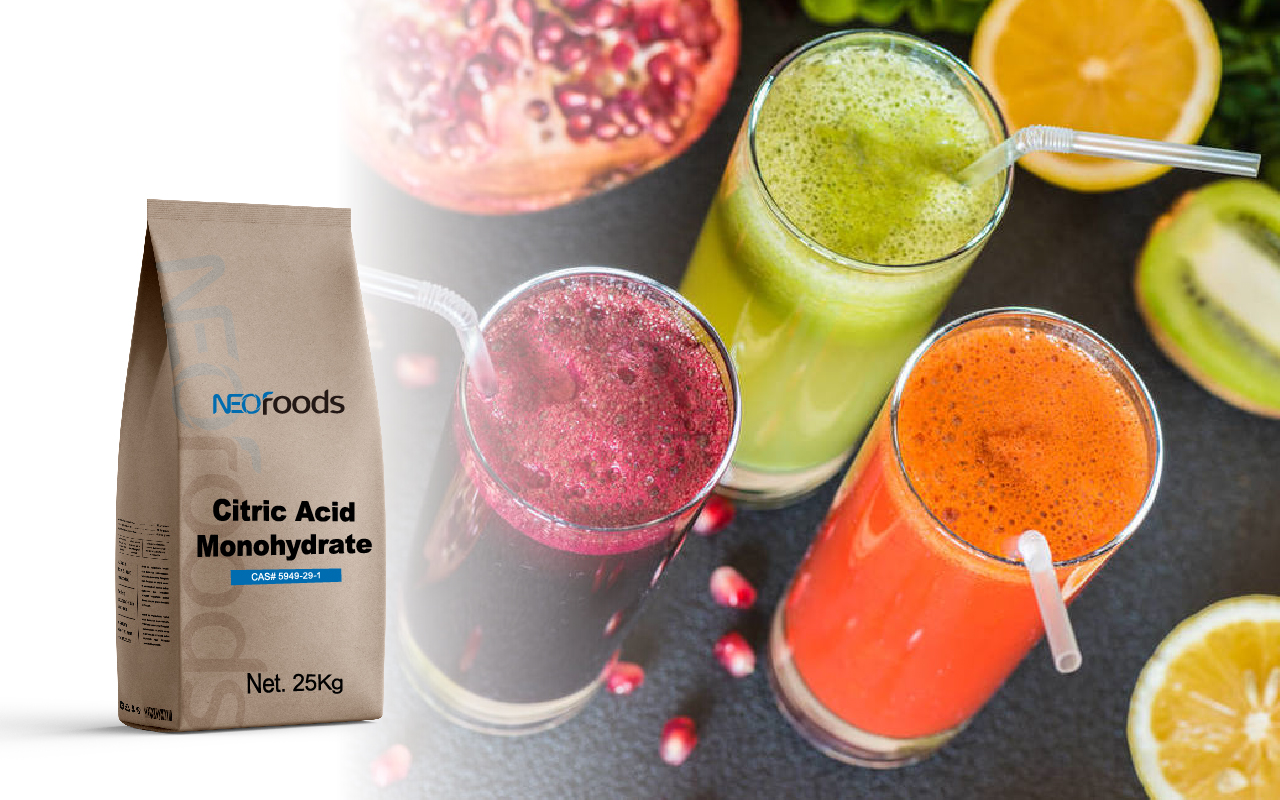
Acidulants in beverages are food-grade, safe acids that do more than just add sourness. They not only improve the flavor of beverages but also extend the shelf life of products. They are suitable for many common products, such as soft drinks, jellies, and baked goods etc.
Let’s go through three of the most common ones.
1. Citric Acid
Citric acid is a natural acid derived from citrus fruits, widely used in drinks for its tart flavor and preservative qualities. Beyond adding sourness, it helps control pH, extend shelf life, and improve freshness. You’ll find it in soft drinks, fruit juices, and even jams—anywhere a sharp, clean taste and longer-lasting product are needed. It’s also a major ingredient in many modern beverages.
Other Functional Applications :
●Salad Dressings: Contributes to flavor balance and helps stabilize emulsions in dressings.
●Nutritional Supplements: Helps to stabilize and preserve vitamins and minerals in fortified foods.
●Meat Products: Serves as a pH regulator and quality improver, it helps in the processing of meats like ham, sausages, and salami.
2. L-Malic Acid
L-Malic Acid is widely present in many vegetables and fruits, particularly in apples, bananas, oranges, beans, potatoes, and carrots. In the food industry, L-malic acid is commonly used in the preparation and blending of beverages, liqueurs, fruit juices, candies, and jams.helping to eliminate tartrate deposits
Key Functional Roles of L-Malic Acid are:
●Acidulant: It provides a natural sour taste to food products, often used in jams, jellies, and beverages.
●Flavor Enhancer: L-Malic acid enhances the flavors of fruits and vegetables, making them more intense and refreshing.
●Flavor Enhancer & Stabilizer: It intensifies fruit flavors and contributes to microbial stability in low-pH products.
3. Sodium Citrate
As acidulants in beverages, Sodium citrate appears as a colorless or white crystalline solid or powder. The compound loses its crystal water when heated to 150°C and decomposes at higher temperatures. It is also soluble in ethanol.
Sodium citrate is safe and possesses excellent pH-buffering ability and stability, making it widely used in the food industry. It serves as a common food additive and represents one of the most in-demand buffering agents in food production.
Other applications of Sodium Citrates are:
●pH Buffering: It provides stable acidity to food products, often used in soft drinks, energy drinks, and wine-based cocktails.
●Preservative: Sodium citrate inhibits oxidative rancidity and bacterial growth, extending the shelf life of luncheon meats and canned seafood.
●Emulsifier & Stabilizer: It acts as a natural texture enhancer by solubilizing milk proteins in processed cheese and preventing phase separation in ice cream and whipped toppings.
Choosing the right acidulant for your beverage is crucial for creating high-quality drinks.
Not all acidulants in beverages work the same. Different beverage types—whether carbonated drinks, juices, sports beverages, or functional drinks—have varying requirements for the type of acidulant, its acidity release profile, and its compatibility with other ingredients. The performance of acidulants in beverages directly affects not only flavor balance but also product stability and shelf life.
Whether you're developing a new beverage formulation or optimizing an existing product, Neofoods offers expert advice on acidulant selection and customized solutions. For more information or sample support, please feel free to contact us—making your beverage formulations more effective, stable, and competitive.




Contact us